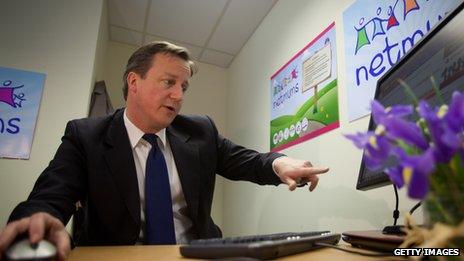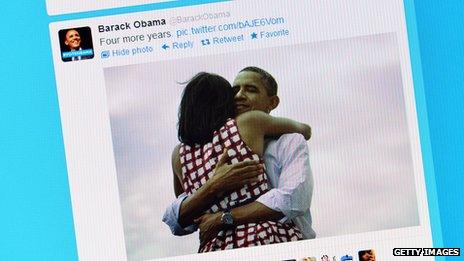Is our democracy moving into cyberspace?
- Published
- comments

David Cameron visits the office of social network site Netmums earlier this year
Politicians have complained of an ambush, after David Cameron was surprised on ITV's This Morning by a list of people named online as paedophiles. Is our democracy moving into cyberspace, and should we be worried in case the values of the internet prevail?
Facebook and Twitter campaigns, it seems, are replacing the old-fashioned demo or sit-in.
In the White House, there is now a team whose sole job is to monitor the world according to social media.
I'd be amazed if No 10 didn't have something similar, watching how the online community responds to current events. And I can imagine the conversations between advisors:
"Badgers has gone viral."
"Plebgate is still trending."
"#savetheashtrees is out of control. We're going to have to respond."
"If we don't react we'll look complacent."
"Or complicit. We need an initiative."
"A review."
"An inquiry."
"Maybe we'll have to change our mind."
"Tomorrow."
And so real political power is shifting, it could be said, from the judicious mainstream to the rushing mob.
In some ways there is purity in virtual democracy. It reflects public mood in real time. It's difficult to rig. Sometimes truth is flushed out, with old power structures helpless to respond.
You can't have a quiet lunch with the editor of Twitter. And even if you could, it would be too late.
But politics by Facebook rarely adds up to considered rational debate. It is visceral communal response. And governments are becoming scared silly by it.
Those old fashioned focus groups, a dozen people in a room, seem irrelevant next to tens of thousands of tweeters suddenly getting angry about something.
Or ridiculing something.
Mitt Romney's phrase "binders full of women" inspired its own satirical Facebook group, external with 12,000 members. Nick Clegg's Apology song, external on You Tube has had more than 2m views.

Barack Obama used Twitter to announce his election victory this week
It can be clever and funny, but with politics conducted on social media, there's no Speaker in his chair, no referee, few rules. So the standards, the manners that govern behaviour in the real world don't always apply.
Want to accuse a public figure of some dreadful crime but don't have proof? Yes, you can Google the accusations in seconds. Hundreds of them.
Maybe with due process sometimes the guilty escape justice. But there's a reason the mainstream media haven't done the same.
It's not just the libel laws. There are deep professional and ethical concerns about adopting the values of the Internet, and troubling signs the mainstream is edging in that direction.
If our democracy completes its journey into cyberspace, and I suspect it might, there are huge questions about just what kind of democracy we will be left with.